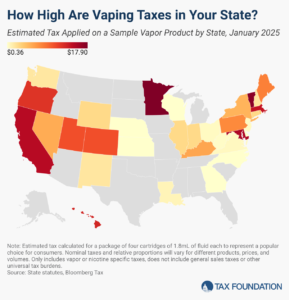- Rapid Growth and Diversity: The vaping industry has expanded significantly, offering a range of products, including open and closed systems. Open systems allow customization, while closed systems, which are simpler to use, have gained popularity despite many lacking FDA approval.
- State Tax Variations: As of January 2025, 33 states and D.C. impose excise taxes on vaping products, with structures varying widely. These taxes can be based on wholesale prices, product volume, or a combination, complicating comparisons of tax burdens across states.
- Public Health and Tax Policy: Vaping is considered a less harmful alternative to smoking, with studies indicating it is 95% less harmful than cigarettes. Effective tax policies should support harm reduction by keeping vaping accessible, as high taxes may drive users back to smoking, undermining public health goals.
Source Tax Foundation

Latest Posts in "United States"
- Which Grocery Items Are Taxed? Understanding U.S. Food Sales Tax by State (2025 Update)
- U.S. Government Reaches Agreement in Principle with the U.K. on Pharmaceutical Pricing
- Understanding Sales Tax Rules for Cyber Monday Discounts: Guidance from California Tax Department
- 2026 Local Sales Tax Rate Changes: What U.S. Businesses Need to Know and How to Prepare
- How to Register for a Puerto Rico Sales Tax Permit: Step-by-Step Guide














